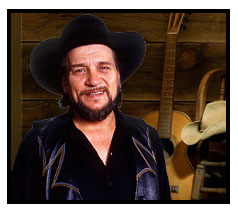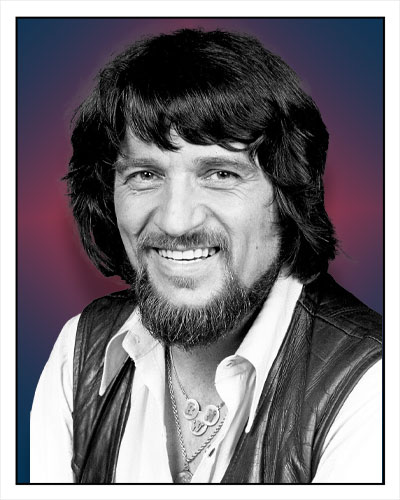 |


 |
|
Musical rebel Waylon Jennings is best remembered for helping to popularize the grittier and more rock-influenced genre known as outlaw country music. Jennings dropped out of school and moved to Lubbock in 1954. There he found work at a local radio station, KLLL, where he met and befriended early rock and roll star Buddy Holly. In 1958, Holly produced Jennings' first single, "Jole Blon," and Jennings played in Holly's backup band, The Crickets, for a time. He was performing with the group on February 3, 1959, and he was supposed to get on a private plane with Holly after their show at the Surf Ballroom in Clear Lake, Iowa. Jennings, however, gave up his spot on the plane to rock star J.P. Richardson — better known as "The Big Bopper" — who wasn't feeling well. Shortly after takeoff, the plane crashed, killing Holly, Richardson, singer Ritchie Valens and the pilot. Heartbroken after the tragedy, Jennings returned to Lubbock for a time and worked as a radio disc jockey. He moved to Phoenix, Arizona, in 1960 and restarted his musical career, forming a band called the Waylors. In 1965, Jennings moved to Nashville. He became roommates with country music's man in black, Johnny Cash, which marked the start of a lifelong friendship. That year Jennings had his first country hit, "Stop the World (And Let Me Off)." By 1968, he had several successful singles, including "Walk On Out of My Mind" and "Only Daddy That'll Walk the Line." Jennings got his first taste of crossover success in 1975 when "Are You Sure Hank Done It This Way" made its way onto the pop charts. Around that same time, he was honored by the Country Music Association as Male Vocalist of the Year. Jennings' participation in the compilation Wanted! The Outlaws (1976) helped him become an even bigger name in music. Joining forces with Nelson, he recorded Waylon & Willie (1978), which went on to sell several million copies. One of their duets from the album, "Mammas Don't Let Your Babies Grow Up to Be Cowboys," reached the top of the charts and gave Jennings his second Grammy Award. He and Nelson shared the honors for Best Country Vocal Performance by a Duo or Group. For the rest of the decade and into the early 1980s, Jennings continued to make hits, including "Luckenbach, Texas (Back to the Basics of Love)" and "Theme from 'The Dukes of Hazzard' (Good Ol' Boys)." In addition to creating the theme song for the television series, Jennings served as the narrator for the country comedy The Dukes of Hazzard. Long known for his partying ways, Jennings' drug use escalated into an expensive cocaine and amphetamine habit, which sometimes cost him as much as $1,500 a day. He decided to quit in 1984. The following year, Jennings teamed up with Kristofferson, Cash and Nelson to form the Highwaymen. Diagnosed with diabetes in the early 1990s, Jennings had trouble walking in his later years. But that did not stop him from making music. In 2000, Jennings recorded several performances at Nashville's Ryman Auditorium for the album Never Say Die Live. He was inducted into the Country Music Hall of Fame in 2001. Later that year, Jennings had to have a foot amputated due to diabetes-related poor health. Jennings died on February 13, 2002, at his home in Chandler, Arizona. Married since 1969, he and Colter had one child together, Waylon Albright "Shooter" Jennings. Jennings had five other children from his three previous marriages. |
|
|
© 1980-2024 lgposs.com. All rights
reserved. |
 By age 12, Waylon Jennings was playing in a band and working as a radio DJ. His style evolved over time, taking on a tougher, more bass-driven sound. He befriended such artists as Willie Nelson, and formed the Highwaymen with Nelson, Johnny Cash and Kris Kristofferson in 1985. By the time of his death, Jennings had become a country music superstar.
By age 12, Waylon Jennings was playing in a band and working as a radio DJ. His style evolved over time, taking on a tougher, more bass-driven sound. He befriended such artists as Willie Nelson, and formed the Highwaymen with Nelson, Johnny Cash and Kris Kristofferson in 1985. By the time of his death, Jennings had become a country music superstar. 